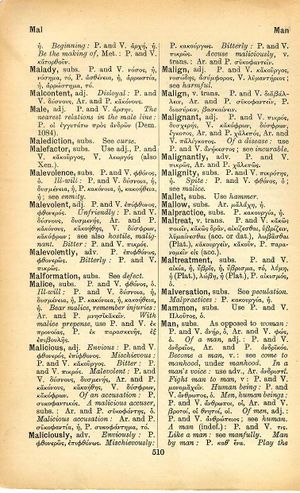malefactor: Difference between revisions
From LSJ
ἔστι δίκης ὀφθαλμός ὃς τά πανθ' ὁρᾶ → there is an eye of justice that sees everything, all-seeing justice
(CSV4) |
(6_9) |
||
| Line 2: | Line 2: | ||
|Text=[[File:woodhouse_510.jpg|thumb|link={{filepath:woodhouse_510.jpg}}]]'''subs.''' | |Text=[[File:woodhouse_510.jpg|thumb|link={{filepath:woodhouse_510.jpg}}]]'''subs.''' | ||
Use adj., P. and V. [[κακοῦργος]], V. [[λεωργός]] (also Xen.). | Use adj., P. and V. [[κακοῦργος]], V. [[λεωργός]] (also Xen.). | ||
}} | |||
{{Lewis | |||
|lshtext=<b>mălĕfactor</b>: ōris, m. id.,<br /><b>I</b> an evildoer, [[malefactor]] (Plautin. and [[post]]-[[class]].): malefactorem amitti satiu'st [[quam]] relinqui beneficum, i. e. it is [[better]] to [[let]] a [[malefactor]] go [[unpunished]] [[than]] to be [[ungrateful]] [[towards]] a [[benefactor]], Plaut. Bacch. 3, 2, 11: ad vindictam malefactorum, Vulg. 1 Pet. 2, 14. | |||
}} | }} | ||
Revision as of 08:36, 13 August 2017
English > Greek (Woodhouse)
subs.
Use adj., P. and V. κακοῦργος, V. λεωργός (also Xen.).
Latin > English (Lewis & Short)
mălĕfactor: ōris, m. id.,
I an evildoer, malefactor (Plautin. and post-class.): malefactorem amitti satiu'st quam relinqui beneficum, i. e. it is better to let a malefactor go unpunished than to be ungrateful towards a benefactor, Plaut. Bacch. 3, 2, 11: ad vindictam malefactorum, Vulg. 1 Pet. 2, 14.

